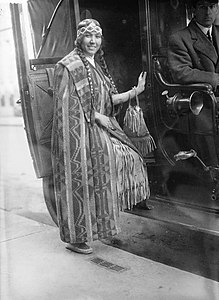Beginnings of the movement
With the rise in studies both in ethnology and in folklore in the late nineteenth century, much information was gleaned and collected about various American Indian cultures. In 1880 Theodore Baker transcribed songs from a number of tribes, publishing them two years later in a German-language dissertation for his doctorate from the University of Leipzig. Edward MacDowell borrowed themes from Baker's work when composing his Second (Indian) Suite for orchestra in 1894.
In 1892, Czech composer Antonín Dvořák arrived to teach in New York City. He exhorted American composers to stop imitating European models, and to turn instead, as he had, to indigenous sources. Composer Frederick Burton took the idea to heart, and transcribed some Ojibway melodies. He later adapted these as art songs.
Later work by ethnographers and musicologists helped to build a body of notated music by Indians, and this aided some composers in searching for musical sources. Carlos Troyer notated their source material themselves in an attempt to be as authentic as possible. Others, such as Harvey Worthington Loomis, borrowed from already-published sources. Charles Sanford Skilton was probably the composer who did most to establish the stereotypes of the genre, with pieces such as his Suite Primeval for orchestra. [1]
Opera composers also attempted to incorporate Indian themes in their work; among Indianist operas were Poia, by Arthur Nevin; Victor Herbert's Natoma; Charles Skilton's Kalopin and The Sun Bride; Alberto Bimboni's Winona; and Francesco Bartolomeo de Leone's Alglala. Charles Wakefield Cadman's Shanewis (or The Robin Woman, 1918) was produced in two succeeding seasons by the Metropolitan Opera of New York and was very popular. It also toured, being produced after World War I in Denver in 1924 and Los Angeles in 1926. DeLeone, Bimboni and Skilton were awarded the Bispham Memorial Medal Award for their operas. [4]

Arthur Farwell was an American composer, conductor, educationalist, lithographer, esoteric savant, and music publisher. Interested in American Indian music, he became associated with the Indianist movement and founded the Wa-Wan Press to publish music in this genre. He combined teaching, composing and conducting in his career, working on both coasts and in Michigan.
Cecile Buencamino Licad is a Filipina classical pianist. She was born in Manila.

Charles Wakefield Cadman was an American composer. For 40 years he worked closely with Nelle Richmond Eberhart, who wrote most of the texts to his songs, including Four American Indian Songs. She also wrote the librettos for his five operas, two of which were based on Indian themes. He composed in a wide variety of genres.

Carlos Troyer, born Charles Troyer, was an American composer known for his musical arrangements of traditional Native American melodies.
American Indian opera is a subgenre of music of the United States. It began with composer Gertrude Bonnin (1876-1938), also known as Zitkala-Sa. Bonnin drew from her Yankton Dakota heritage for both the libretto and songs for the opera The Sun Dance. This full-scale opera was composed with William F. Hanson, an American composer and teacher at Brigham Young University in Utah.
The Wa-Wan Press was an American music publishing company founded in 1901 by composer Arthur Farwell in Newton Center, Massachusetts. The firm concentrated on publishing compositions by so-called Indianist movement members—composers who incorporated traditional Native American music into their works. Although it never achieved its founder's intentions of fomenting a classical musical revolution in the United States, the company saw success during its eleven-year history before being acquired and abandoned by G. Schirmer in 1912.

Natalie Curtis Burlin was an American ethnomusicologist. Curtis, along with Alice Cunningham Fletcher and Frances Densmore, was one of a small group of women doing important ethnological studies in North America at the beginning of the 20th century. She is remembered for her transcriptions and publication of traditional music of Native American tribes as well as for having published a four-volume collection of African-American music. Her career was cut short by her accidental death in 1921.

Shanewis (1918) is an opera in one act and two scenes by American composer Charles Wakefield Cadman with an English-language libretto by Nelle Richmond Eberhart.
This is a timeline of music in the United States from 1880 to 1919.

Harvey Worthington Loomis was an American composer. He is remembered today for his associations with the Indianist movement and the Wa-Wan Press.
Charles Sanford Skilton was an American composer, teacher and musicologist. Along with Charles Wakefield Cadman, Blair Fairchild, Arthur Nevin, and Arthur Farwell, among others, he was one of the leading Indianist composers of the early twentieth century.

J. Blair Fairchild was an American composer and diplomat. Along with Charles Wakefield Cadman, Charles Sanford Skilton, Arthur Nevin, and Arthur Farwell, among others, he is sometimes grouped among the Indianists, although he had only a marginal association with their work.

Arthur Finley Nevin was an American composer, conductor, teacher and musicologist. Along with Charles Wakefield Cadman, Blair Fairchild, Charles Sanford Skilton, and Arthur Farwell, among others, he was one of the leading Indianist composers of the early twentieth century.

Alberto Bimboni (1882–1960) was an Italian-born American composer and conductor. He is remembered today, if at all, for his opera Winona; consequently, he is sometimes grouped with other composers of the Indianist movement in American music.
The Bispham Memorial Medal Award was an award for operas written in English which was named for baritone David Bispham, who was a great proponent of performing opera in English in the United States. It was traditionally awarded to American composers, frequently for an opera on an American subject. It originated from the Opera in Our Language Foundation, Inc., founded by composer Eleanor Everest Freer, and Edith Rockefeller McCormick, in 1921. After David Bispham's death in October 1921, Eleanor Everest Freer also founded the David Bispham Memorial Fund, Inc., in March 1922. Eleanor Everest Freer was chairman, and Edith Rockefeller McCormick was treasurer, of both organizations. On April 7, 1924, the two organizations merged to become the American Opera Society of Chicago. The first medal was awarded by the American Opera Society of Chicago in 1924 to Ernest Trow Carter, for his opera The White Bird, which saw its first full performance at the Studebaker Theater, in Chicago, on March 6, 1924. The last Medal for an opera was awarded around 1953 to Vittorio Giannini for The Taming of the Shrew. The award was funded in part by David Bispham's will, and also in part by Eleanor Everest Freer, who, in addition, was one of its recipients. Other recipients include :

Francesco Bartolomeo DeLeone was an American composer of Italian descent.

Preston Ware Orem was an American composer, pianist, and writer on music. He is frequently grouped with other composers as part of the Indianist movement in American music.
Thurlow Weed Lieurance was an American composer, known primarily for his song "By the Waters of Minnetonka". He is frequently categorized with a number of his contemporaries, including Charles Wakefield Cadman, Arthur Nevin, Charles Sanford Skilton, Preston Ware Orem, and Arthur Farwell, as a member of the Indianist movement in American music.

Tsianina Redfeather Blackstone was a Muscogee singer, performer, and Native American activist, born in Eufaula, Oklahoma, then within the Muscogee Nation. She was born to Cherokee and Creek parents and stood out from her 9 siblings musically. From 1908 she toured regularly with Charles Wakefield Cadman, a composer and pianist who gave lectures about Native American music that were accompanied by his compositions and her singing. He composed classically based works associated with the Indianist movement. They toured in the United States and Europe.

Nelle Richmond Eberhart was an American librettist, poet, and teacher. She is known for her long collaboration with composer Charles Wakefield Cadman. She wrote 200 songs and the librettos for five operas for which he composed the music.












